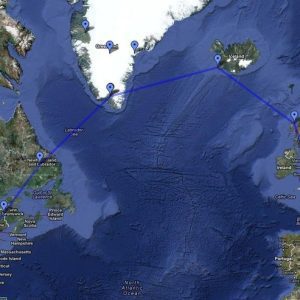Humans are ridiculously good at killing things.

So you are 100% correct that an ordinary stone age hunter against a bear, with nothing but his bare hands, is going to die.
But a stone age hunter is going to run away, if at all possible, go back and get his spear and a bunch of his buddies and their spears and then go kill the shit out of that bear, eat it for dinner and wear it’s skin to let the rest of the bears know not to mess with him.
Even if he can’t get away and gets killed by the bear. His buddies will probably find his remains and realise there is a dangerous, and tasty, bear in the area. They will then hunt down and, again, kill the shit out of that bear.
The biggest issue is that we can remember, plan, and coordinate. So let’s say you are Mr. Bear, and we kill one of your cubs. If we get away, you are liable to be angry for a while, but you will eventually forget about it and, the next day, you will go out foraging for berries and nuts and whatnot. But, if you kill one of our kids, we will not only remember it, we will tell other humans about it, and we will then collectively hunt your ass down and kill you and any other big furry asshole in the immediate vicinity, just in case one of the innocent bears gets the idea that killing humans is cool.
It’s Human intelligence and human tools that make us dangerous. Not human fangs and claws.
Humans have one such ability that trumps the sharp, dagger-like teeth, pointed claws, insanely-muscular limbs and even more insane jaw strength.
No, I’m not talking only about the brain. Sure, it is a huge advantage but not the focus of discussion right now. I mean, other primates may not be able to create a nuclear bomb but they still sail through the wilderness with the specific trait I’m talking about.

The opposable thumb.
We can grab things because of this superpower. And after grabbing, we can throw them away.
Doesn’t ring a bell?
It would now.

Opposable thumbs provide us with a distinct advantage of being able to kill animals without needing to come in their vicinity.
Teeth, claws, and muscle power aren’t of much use if the predator lurks tens of metres away.
Coming to the brain, it has helped us to develop effective substitutes for raw muscle power. Think of something akin to shooting canines and claws from a distance.

Although, it is not that we were never attacked, but we have known how to handle it well.
It’s a 19th Century myth that humans’ sense of sight and smell is weak compared to the rest of the animal kingdom.
The thing that probably stops most predators from killing us, over the course of our evolutionary history, is that we see them before they see us and move or make lots of noise. Predators then have to exert more energy hunting us down and probably fight a whole group of humans.
In terms of colour perception, humans are near the top in mammals. One mammal with better colour perception than us is the tetrachromatic reindeer (who are also some of the only mammals with ultraviolet colour perception and red-green perception; some dichromatic rodents do have UV perception from their blue cone). Most mammals do not have more than two types of colour cones in their eyes.
Having better colour perception allows us to see colour patterns that are invisible or much more subtle to other animals. Almost every mammal is a dichromat with two colour rods, but humans and a handful of our closest Ape relatives are trichromats. To dogs, deer, lions, and a portion of humans, the distinction between green shades and red shades is much more subtle:

On top of that, humans also have the best daytime angular resolution of any other documented mammal (at 1 minute angular resolution, compared to 10 minutes for a cat).
Directly related pattern recognition, the human eye has the fastest cycles per degree of visual acuity of any mammal which vastly increases the spatial processing capacity of our visual system and increases the amount of information going to our brain (Data from Hayes et al., 2007):

The notion that human visual perception is only good because our brain is so good is Cartesian, Freudian, and Victorian. No matter how big our brain was, if our visual acuity was worse, we would see fewer patterns in the first place.
If you take a dog on a walk, and you are paying attention to the world around you, odds are you will see an animal way before your dog does. Your dog will smell an animal before you do though. The only time my dogs have ever sighted an animal before me I was on my phone, or the animal was low to the ground (e.g., under a car) and I couldn’t see the animal at human-height.
We aren’t blind-deaf disembodied brains compared to other animals. Human eyes are very powerful and decrease the likelihood of being ambushed. They further decrease the likelihood of a predator picking off a human alone by giving a human ample time to raise the alarm.
If Zebras and Antelope had as good of eyesight as humans, Lions would probably starve to death. The amount of time between each feeding would increase to the point that they would be exerting more energy to kill a zebra than they gain from eating one.
The eyesight of other mammals is, on average, poor. Hunters go off in the woods wearing orange vests so that other hunters don’t accidentally shoot them, and they still sneak up on deer.

Yeah she has a rifle, but a human would see her beyond the range of a typical rifle (which is the point of her attire).
I’ve been getting hundreds of comments I agree with saying:
BUT TOOLS!!!
Yes. Tools help humans too, to beat a dead horse that is mentioned in every other answer to this question one more time.
When I wrote this answer though, I was also thinking of humans without tools and even prehistoric times before proto-humans developed tools. Humans have been around a lot longer than tools.
I have also been getting hundreds of comments I disagree with saying:
Humans take revenge on animals. This is why animals don’t hunt humans.
This would require animals to have inter-generational transmitted knowledge of human vengeance, and a psychological model not only of themselves, but a model of the anticipated behaviour of humans if a human dies.
I am open-minded enough to agree some animals are smart enough for that, but certainly not bears, for instance. Bears cannot even figure out to use wildlife overpasses to avoid getting killed by cars:

Hallstrom et al. (2008) found bears were killed in traffic collisions at a rate that increased or decreased proportional to traffic, despite the construction of dozens of wildlife crossings throughout Alberta, Canada. You are telling me bears are smart enough to know that if they kill a human, it’s a death sentence, but aren’t smart enough to walk on that to cross the road.
Predatory animals going extinct due to human activity is a relatively new thing on the time scale. The first species, to my knowledge, that this is speculated to have happened to is sabre tooth tigers (or Smilodons).
However, most scientists believe Smilodons went extinct due to their food sources dying off (perhaps due to humans eating their prey), not because humans hunted Smilodons to extinction (see Chimento et al., 2019).
There isn’t any evidence wolves were hunted before 8,000 years ago (Mech et al., 2003) and they obviously occasionally ate humans before then. The reason humans started hunting wolves was mainly to protect livestock.
In parts of the world where humans did not become nomadic herders, like North America, wolf populations continued thriving until European herders showed up.
Another species of animal which frequently eats humans is the crocodile. They eat 1,000 humans per year and have not been hunted to extinction.
Most humans avoid being eaten by crocodiles not through tools but by seeing them and avoiding water with crocodiles in it. Conversely, most humans who get eaten by crocodiles fail to see a crocodile, go in the water, and then munched on.
At any point in human evolutionary history, tools or not, if humans were eaten by predators more often than we reproduced we would have gone extinct. Tools have obviously played a role in putting humans on top of predators.
I have gotten a few comments saying:
Human eyes face forward, therefore they exist for hunting because we are natural predators.
Every primate has forward-facing eyes and so do Koalas. Our eyesight is good for depth perception not for offensive or defensive reasons, but because we spent most of our evolutionary history in trees where depth perception was very important.
Coincidentally, having good depth perception also helps everywhere except in underground dens or caves, and is excellent for constructing partially-obscured images (e.g., part of a leopards face as it stares at you through tall grass).
Additionally, animals that are upright on two legs can spin so having eyes on the side of the head isn’t as important. A human can turn much faster than a deer or a gazelle.
One herbivorous group of animals, Kangaroos, also tend to have forward-facing eyes. Like humans, they can spin to face the sound of an approaching predator without taking 10 steps using four different legs.






